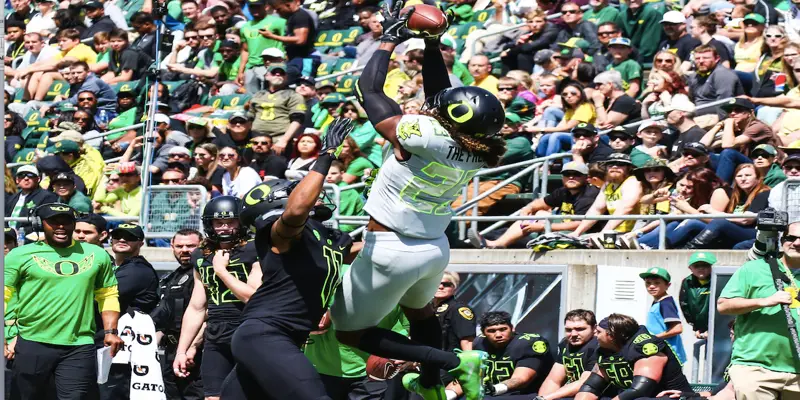The Spring Game this year was a party for the program. It showed how much progress has been made since the end of last season.
A lot of big-picture developments in recruiting, team building and coaching philosophy have been gleaned from it. After reviewing the film a few more times, I wanted to use some Spring Game material for some discussion points about the game of football and to learn more about Duck Football.
Play-Action Pass
The one development I am most excited about is the use of the Play-Action Pass. This is where the offense runs what looks like a run play, but at the moment the quarterback is supposed to hand the ball off to the running back, the quarterback instead fakes the handoff and keeps the ball, looking to pass it to a wide receiver down field.
I learned the importance of the play from reading legendary coach Bill Walsh’s work. He said ”I truly believe it (play-action) is the single best tool available to take advantage of a disciplined defense.” If Walsh believed in it that much, I thought it must be worth looking into.
The basics sound easy enough: fake the handoff to the running back and throw the ball. But the devil is in the details — the offense must execute at every level. The offensive line has to fire out as if they are run blocking, the running back has to take the same determined path, the receivers must release off the ball like they are blocking and the quarterback has to sell the handoff.
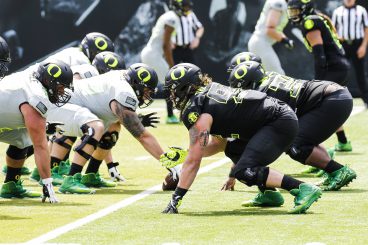
Oregon’s Power on the Line of Scrimmage.
If any one of these doesn’t sell the fake, the element of surprise is gone and the defense will be in a position to make a play.
Coach Willie Taggart comes from the West Coast Offense coaching tree, which Walsh was a chief architect of. So he knows the effectiveness of the play-action. Oregon is not running a WCO, but the spring game showed me they will be incorporating a lot of play fakes into their offense.
The play-action works well for Oregon, with the strength of the personnel on the offensive side of the ball. With Royce Freeman poised to have a huge year, and emphasis on power from the offensive line, Oregon’s offense should be great again running the ball. Opponents will be aggressive to stop the run as always, but with a quarterback like Justin Herbert, the offense can strike up some huge plays in the passing game by utilizing good run fakes with Freeman and Herbert.
The reason the play-action is so hard to defend, even for a disciplined defense, is that the play starts out as a basic running play. The defense is usually very focused on stopping the run. They have seen running plays on film a hundred times, their coaches have told them about a hundred times to stop the run, and their scout team has run running plays dozens of times during the week. By Saturday the defensive players are ready to stop the run.
Once they see the play start to unfold, the defensive backs stop paying attention to the wide receivers, and linebackers take a couple steps forward, leaving plenty of room for the receivers to work.
Once the quarterback pulls the ball out it is too late. The defense has committed to the run, and now there is space behind the linebackers who are overcommitted to stopping the run. The video below shows how much the defense can be affected and how open a receiver can get with a good play fake.
Football is a situational game, and it takes work in the run game to set up a good play-action pass. When calling a play-action play, timing is every bit as important as execution. The best times to call it are in obvious running situations like first down or second/third and short. My favorite time for calling a play-action pass is on first and goal. In this situation, a defense is usually selling out to stop the run, and a good fake can lead to an easy score.
There are also times not to call it. A lot of college teams will try the play-action pass on third and long or in other obvious passing situations. All this does is give more time for the pass rush to get home. Play-action passes are not quick hitting, because the run fake takes time to carry out.
Overall the play-action pass is a great tool for any offense to gain explosive plays in the passing game by taking advantage of good defensive fundamentals.
Under Center Series
One addition I would like to see to the offense is the quarterback taking snaps from under center. I wouldn’t want to see the offense operate solely from under center, but I think if they could execute a couple of plays it would make them even better. The hardest player it would be on is the quarterback, but Herbert is more than capable of excelling at it.
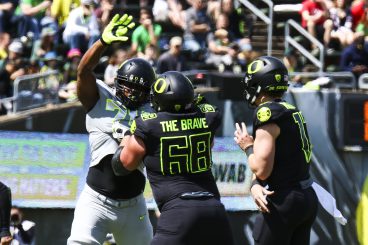
Oregon ‘Team Brave’ Offensive Pass Play
Here are some pros to adding under center to the offense. It gets the ball into the decision maker’s hands immediately. The quarterback can feel the snap hit his hands rather than looking at it from the shotgun. This means his eyes can be on the defense and he can read the coverage that much faster instead of taking his eyes off of the defense to look the shotgun snap in.
I have noticed a few times this spring the snaps have been low, which disrupts the timing. One instance of this led to an interception.
The quick screen game can become even quicker, since the ball gets to the quarterback faster.
Quarterback sneaks with a big 6-6 player are always a threat on short yardage under center. This makes the defense honest, because it has to cover the center or else leave the offense with an easy play to make for the conversion.
The play-action game would benefit because the running back takes longer to get the ball from under center. Therefore the running action is longer. This freezes or displaces the defense even more than they would be out of shotgun (since the handoff is much quicker in the shotgun), giving the offense even more space to throw into.
Punting Isn’t Winning
Punting is not a glamorous topic; it is the football equivalent of a sacrifice bunt. But I found a punt formation from the spring that brings up an interesting punting philosophy.
One aspect of South Florida’s play last year that I did not like was their punt team formation. The used a “shield” style, where they have three players protecting the punter and seven other players on the line of scrimmage.
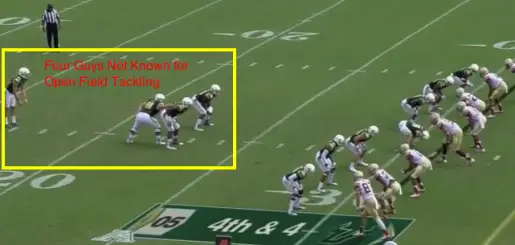
Three Offensive Linemen and Punter
The problem with this lies in the use the personnel in the shield style. USF had three offensive linemen blocking seven yards from the line of scrimmage. Those three combined with the punter left only seven capable bodies tackling a punter returner in the open field, with 10 blockers in front of him.
To a coach, that is a scary position to be in because as plain as punting is, sloppy punt coverage can give up game-changing plays. You want to eliminate the risk of game-changing plays during the game as much as possible — special teams included.
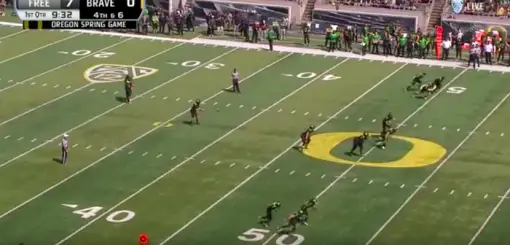
One Protector and One Punter, No Oline Personnel.
When Oregon punted for the first time, I was curious about their formation use and personnel grouping. They looked much better than the ones USF had put on tape. Although Oregon did not do any live coverage, the formation and personnel passed the eyeball test.
As a coach and a fan, I am excited to see the malaise of last season’s on-the-field play and seeming indifference towards recruits suddenly morph into a team of energy and a staff that is a juggernaut on the recruiting trail. Oregon did a great job identifying Willie Taggart, and in return, he has done everything one coach can do in this short period.
I see a great season ahead for the Ducks, and a return to a program fans can be proud of once again.
Coach Ruskin Fiegenbaum
Beaverton, Oregon
Related Articles:
Ruskin has been following the Ducks since the ’94 Rose Bowl. He graduated from the University of Oregon in 2007 and has been coaching football in the Portland-Metro area since 2008.

